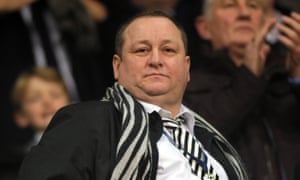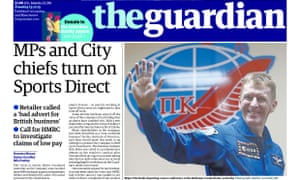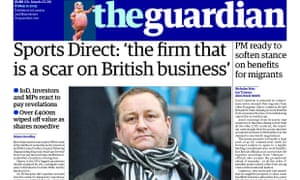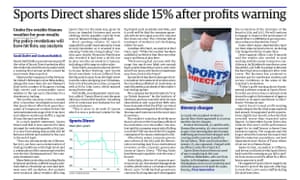Sports Direct falls out of FTSE 100 following Guardian investigation
Share price has slumped more than 40% since start of December when we began series on working conditions and trading woes

Photograph: Colorsport/Corbis
Sports Direct has been relegated from the FTSE 100 following a torrid three months in which £1.6bn has been wiped from the retailer’s value after a Guardian investigation into working conditions and a slump in trading at its stores.
The group’s share price is now down more than 40% since the start of December and the retailer’s demotion from the premier league of UK listed companies was on Tuesday characterised as an example of the punishment investors can mete out to large companies that appear not to treat their workers fairly.
Frances O’Grady, the general secretary of the TUC, said: “This should be a cautionary tale for companies who treat their workers badly. The reputational and financial damage Sports Direct has suffered is of its own making.
“Subjecting staff to workhouse conditions is not the way to build a successful business. Shareholders must demand root and branch changes or Sports Direct’s name will continue to be dragged through the mud.”

Chuka Umunna, the former shadow business secretary who triggered a parliamentary debate on the retailer following the Guardian’s revelations, said: “What this illustrates is that good business is good business and vice versa. So if you’re going to be seen to be pursuing a business model that customers do not approve of there will be an impact on how the company is viewed and valued.
“Investors and customers are not only looking for good value. Increasingly they are looking for good values in a company.”

In December, a Guardian investigation revealed how thousands of temporary Sports Direct warehouse workers were receiving hourly rates effectively below the minimum wage.
Undercover reporters employed inside the retailer’s warehouse in Shirebrook, Derbyshire, found how thousands of workers were subjected to an extraordinary regime of searches and surveillance, while local primary schoolteachers also told the Guardian that pupils could remain in school while ill – and return home to empty houses – as parents working at the depot were too frightened to take time off work.

The disclosures prompted the Institute of Directors to brand the company a “scar on British business” and Umunna to file an urgent parliamentary question, which resulted in the business minister Nick Boles being summoned to the Commons to answer questions on the scandal. During the debate, a succession of MPs called for HM Revenue & Customs to investigate if the company had breached minimum wage legislation.
Sports Direct responded by announcing a pay rise for its staff, as well as a review of all agency staff terms and conditions, which was to be overseen personally by its billionaire founder, Mike Ashley.
In January the retailer shocked the stock market with a warning that annual profits would be £40m lower than expected, which caused the value of the company to slump by almost half a billion pounds.

When asked if it had launched any official investigation of Sports Direct, an HMRC spokesperson said: “While we don’t discuss individual cases, we always investigate businesses where we believe the national minimum wage is not being paid. We act on information from a range of sources, including workers, third parties or from our own proactive intelligence work.”
The retailer has denied that it has failed to pay the minimum wage, while Ashley’s review into the treatment of his own workforce is not expected to report for several weeks. In the meantime, local MPs are to visit the company’s warehouse on 21 March, an invitation the tycoon also extended to members of parliament’s business, innovation and skills select committee.
A spokesman for the committee said there were no plans for its members to visit Shirebrook, and that it was in correspondence with Ashley regarding a future appearance before the committee.
The quarterly review of the constituents of London Stock Exchange’s main indices will take place on Wednesday and is expected, formally, to relegate Sports Direct from the UK’s 100 most valuable listed firms.
The reshuffle is based on the value of companies following the market’s close on Tuesday, at which point the retailer was ranked 142nd on the LSE’s main market.
Ashley Hamilton Claxton, the corporate governance manager at Sports Direct shareholder Royal London Asset Management, said: “It is hardly surprising that Sports Direct has fallen out of the FTSE 100. Over the long term, shareholder value is intrinsically linked to corporate governance and companies ignore this at their peril. The long list of corporate governance failings at Sports Direct is a contributing factor in its fall from the FTSE 100 in our view.”
Sports Direct shareholders have long complained about the weak governance at the retailer, which they feel is effectively run like a private company by the founder, who still owns 55% of the shares.
Their complaints include the lack of strong independent directors to challenge Ashley, his unorthodox tactic of using Sports Direct funds to take stakes in other retailers and efforts by the company to award further shares to the billionaire in return for the company hitting financial targets.
Crispin Odey, a City hedge fund manager and Sports Direct shareholder who once called Ashley a “genius”, publicly revised his view in December, describing him as “difficult to house train” and characterising his authority over the retailer’s other directors as “dangerous”.
Since the Guardian started publishing the results of its investigation on 9 December, when Sports Direct shares opened at 684p, the shares have lost 274p each to close at 410.3p.
The share price slump, which coincided with two negative statements about how the stores were trading and concerns that rival JD Sports is stocking superior products, has personally cost Ashley about £900m of his paper fortune during that time.
[Source:- Thr Gurdian]

